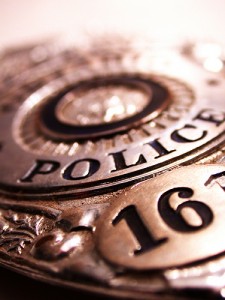
Photo by Scott Davidson
When news about the school shooting at Sandy Hook Elementary School hit last December, New Jersey police chief Vincent Caruso’s mind started turning.
As the head of the police department and a member of the School Board in Lodi, a town of about 25,000 in Bergen County, Caruso knew he had to take an active role in updating the town’s school safety procedures. Armed school resource officers already patrolled Lodi’s middle and high schools, but Caruso, with images of Newtown fresh in his mind, was concerned about the town’s five elementary schools.
“That was the first time where it actually hit home at an elementary school,” Caruso, who has three young children in Lodi’s elementary schools, said. “When you start killing kindergarteners and first graders, all bets are off.”
Caruso developed a plan to put retired police officers armed with guns in Lodi’s elementary schools. The proposal passed the Lodi School Board last month and will be implemented at the start of the 2013-14 school year, and will cost about $200,000 a year. Since the security plan passed about two weeks ago, Caruso said he’s received several calls from curious school officials across New Jersey who are considering adopting similar security measures.
School districts across the country are reconsidering their security plans in the aftermath of the Newtown massacre, and several have already voted to put armed police officers in school buildings. As the gun control debate starts to pick up steam in Congress, Republican senators reportedly reached an agreement on an expansion of background check for gun buyers, and the National Rifle Association has continued to call for school staff to be trained to use and carry guns.
The discussion about police in elementary schools comes as many juvenile justice advocates worry that the experiment in high schools that has been playing out in cities across the country for decades has been a failure and has resulted in more teens ending up in the system for minor infractions better handled by school officials than law enforcement.
Even here in, the largely blue stronghold of New York’s greater metropolitan area, the debate over how to respond to the slaughter exposes how divided otherwise like-minded people are on what to do to keep their children safe. Even in Newtown, where the families of victims were instrumental in lobbying both the state house in Hartford and lawmakers in Washington, D.C., for efforts in gun reform, local officials have welcomed the idea of protecting its elementary schools with armed personnel. The Board of Education in Newtown is moving forward with plans to put armed school resource officers at the town's four elementary schools.
A short drive from Midtown Manhattan either to the north or the south will land you in small towns and school districts who are receptive to the idea of finding some armed response to Adam Lanza’s bloody legacy. Here, Mayor Michael Bloomberg has made New York City the de facto headquarters for the fight against the National Rifle Association and its push to get more guns into schools.
Bloomberg, a staunch gun control supporter who has pledged to use his vast fortune and his prominent public bully pulpit in an effort to stem gun violence, called the NRA’s controversial proposal to arm teachers “dystopian” last December. He had a similar reaction to a plan from Staten Island’s Community Education Council (CEC) 31, to use 500 retired New York City police officers armed with concealed weapons to protect schools around the city, all part of a “comprehensive” security overhaul that also called for the installation of silent alarms, buzzer entry systems and video cameras in school buildings across the city’s five boroughs.
Mike Reilly and Frank Squicciarini, two retired NYPD officers who sit on CEC 31, developed the security plan, which passed the education panel in January. A few weeks later CEC 24, covering part of Queens, also endorsed the plan, which Reilly says will function somewhat like the federal Air Marshal program, with the 500 retired cops rotating through the estimated 1,200 school buildings in New York City.
Reilly knows his plan faces a long, uphill battle in New York City. The idea of adding armed guards to schools, whether they’re retired law enforcement or not, remains controversial for many in the city. And Reilly noted in a recent interview that nearly the entire City Council is up for election this year, making it even tougher for his plan to gain traction.
Despite the difficult politics facing Reilly’s plan, he was encouraged recently when the state Assembly passed, and Gov. Cuomo signed, a budget bill allowing retired officers to work for the Department of Education and make more than the current $30,000 limit without a waiver. Cuomo’s gun control bill also allows school districts to get grant money to make security upgrades like reinforced doors and video cameras.
Since the CEC 31 plan in Staten Island was released, Reilly has argued it represents a far less radical approach than what the NRA has proposed. Retired law enforcement would come to the job with appropriate training and they’re already licensed to carry concealed weapons.
“We’re talking about using a resource that is already available,” Reilly said. “We’re not adding more guns to the streets of New York.”
Like Reilly, Caruso said he was opposed to arming teachers or bringing in private security guards for school security.
“I’m not for bringing someone in from outside to do that type of work,” Caruso said. ‘These guys are familiar with the schools, they’re familiar with the community.”
Lodi is believed to be the third town in New Jersey to approve plans to put armed guards in all of its schools. Marlboro and Totowa quickly updated their security plans after Newtown, and armed police officers were stationed at schools when students returned after the Christmas break. The debate over cops in schools, particularly at the elementary level, is also raging in Connecticut, where the towns of Enfield and North Branford have approved plans for armed guards in schools.
Still, there is opposition to the expansion of cops in Connecticut’s schools. Abby Anderson, the executive director of the Connecticut Juvenile Justice Alliance, an advocacy group based in Bridgeport, said she’s concerned the officers assigned to schools in Connecticut will inevitably get involved in mundane discipline issues.
She said research shows students in poorer school districts are nine times more likely to get arrested at school than their more wealthy peers, and cops in schools may result in the unintended consequence of pulling students into the criminal justice system for things like school yard fights or tobacco possession. Anderson’s organization is backing a bill that would require a memorandum of agreement between school districts and local police departments that would lay out procedures and policies for cops assigned to patrol schools.
“In an ideal world, not having cops in schools is preferable, but that ship has kind of sailed,” she said. “A lot of times when you have police officers, the tool they use is arrest. It’s not because any has bad intention, but they don’t have these conversations.”
